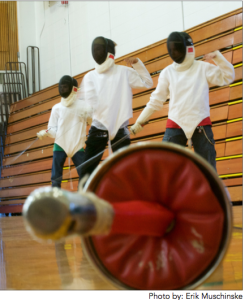Fencing Club starts the semester with a jab
By: Katie Hayes
Editor-in-Chief
Eleven years ago, Fencing Instructor William McDevitt brought the sport to Meramec. Since then, McDevitt has served as the Fencing Club adviser.
“Whenever the Olympics are here, we have a surge of students who want to start fencing,” McDevitt said. “So every four years, there is a big surge.”
McDevitt said that nearly every member this semester is new to fencing. However, Fencing Club President Matt Willerding began fencing for more than 20 years ago. After a 10-year hiatus, he took Fencing I with Instructor McDevitt.
“I had been out of fencing for a really long time and I had forgotten how much I liked it,” Willerding said.
Willerding now takes private lessons and is helping new fencers in the club learn about the sport.
“There’s a very steep curve you hit,” Willerding said. “If you are a good beginner like I was — fast with good re exes, you are athletic — you will do really well at the start, but then you run into these guys that have been fencing for a long time. It’s very, very skill based.”
Ninety students signed up to join Fencing Club during the campus expo.
“The first practice was crazy,” Willerding said. “We had more than 20 people and it was just me trying to teach everybody there — and I’ve never taught anybody how to fence before. I’ve had some really good coaches, so I was really surprised at how well the first one went.”
Although fewer members attended the second meeting, Willerding said the ones who stayed were more dedicated.
“The last [meeting] was good, too,” Willerding said. “We had about a third of the people at the meeting. But those people are really into fencing and they’re really enthusiastic about it. And you know, everybody is trying really hard and taking it seriously, so I was really happy with the how they have been doing.”
McDevitt said beginning fencers tend to fence how they see it done in the movies.
“In my experience of teaching over the years, people have a tendency of what I call ‘swashbuckling’ like in the movies — ‘Zoro’ and everything — banging blade,” McDevitt said. “But the art is to control the weapon.”
McDevitt said the learning curve for a good competitive fencer is four years.
“When you first start out, it’s 75 percent physical and 25 percent mental,” McDevitt said. “You don’t know what the heck you’re doing. Next two years, it’s 50/50. And by the time the fourth year comes around, it’s 75 percent mental. Everybody knows what the game plan is, how you fake and how you duel.”
Willerding said he experienced the learning curve as well.
“I was fencing guys who were like in their forties and fifties and they were just beating me up when I was a teenager and in my twenties,” Willerding said. “I didn’t have the discipline and the patience to develop any sport as well as I should have.”
Willerding said it is important to have experienced fencers in the club to teach newcomers.
“If you don’t have anybody who knows how to fence, and just a bunch of beginners, that would be like chaos, broken equipment and bloodshed,” Willerding said.
“Well, not really, but you do need teach people how to fence.”











